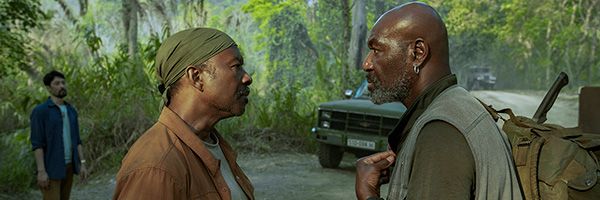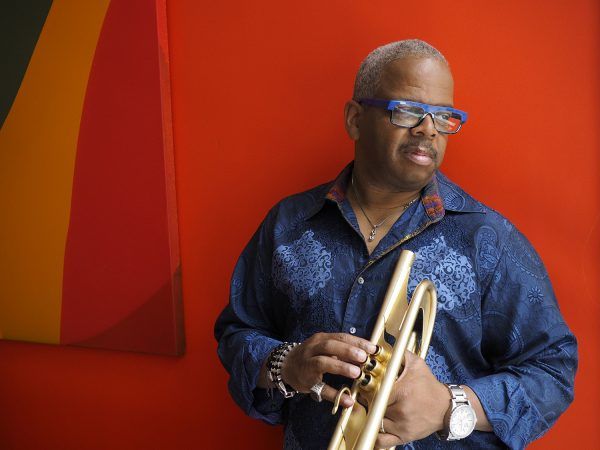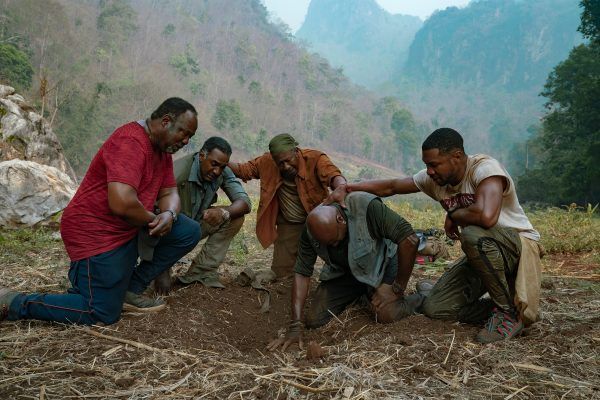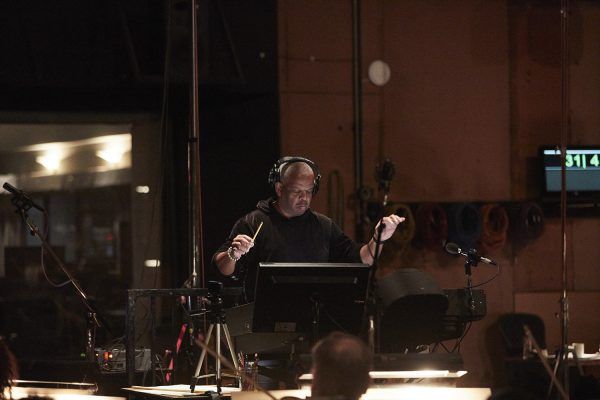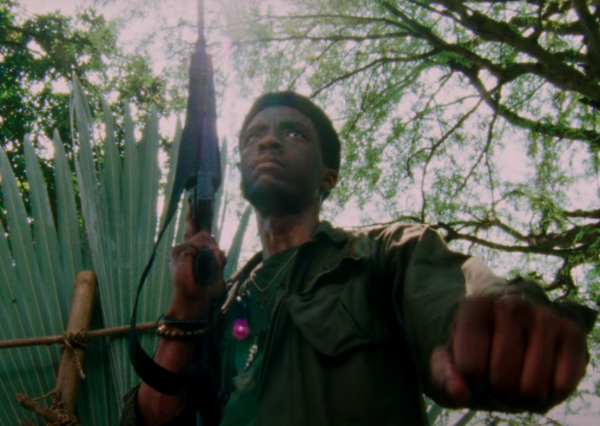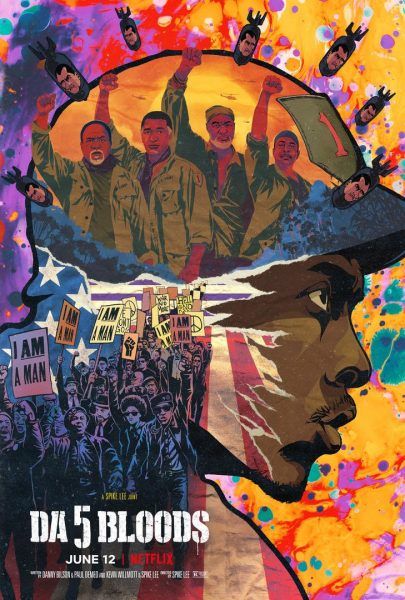Composer and musician Terence Blanchard is synonymous with the work of Spike Lee. Starting with 1991’s Jungle Fever, Blanchard has composed the score for almost every single Spike Lee joint, and the musician’s work is as striking and diverse as Lee’s films. Blanchard received his first-ever Oscar nomination for his work on Lee’s 2018 film BlacKkKlansman (which also scored Lee’s first-ever competitive Oscar win for Best Adapted Screenplay), and one would think in following up that incredibly well-received film that Lee would maybe take a break or at least take it easy. Instead, he made Da 5 Bloods—an ambitious and confrontational film about the Vietnam War, among other things—as quickly as possible.
The new film, which is a Netflix original, follows four Vietnam War veterans who return to Vietnam to recover the body of their fallen squad leader and try to track down a treasure trove of gold they left behind. But old wounds run deep, and within the film Lee examines themes of race, politics, family strain, and the lingering effects of the Vietnam War on Black American soldiers and the Vietnamese whose lives were irrevocably changed.
It’s one of Lee’s most ambitious films, boasting an Oscar-worthy performance from Delroy Lindo and, yes, another Oscar-worthy score from Blanchard. The composer toes the diverse tonal line between triumphant and hopeful and then deeply sad and unsettling. I recently had the chance to speak with Blanchard over the phone about his terrific work on Da 5 Bloods, and he talked about being taken aback by the film’s graphically confrontational opening sequence (which was the hardest to score, by his estimation), ensuring his music worked alongside the music of Marvin Gaye that Lee features heavily throughout the film, and why his working relationship with Lee hasn’t changed over the years. Indeed, we also discussed Blanchard’s process and the inherent trust built into his relationship with Lee, as well as the tonal diversity that Lee’s films bring which then allow Blanchard to continually change things up with his music.
It’s a wide-ranging and fascinating conversation that I hope you’ll find as insightful as I did. Check out the full interview below. Da 5 Bloods is now streaming on Netflix.
When Spike says he's doing this project and brings it to you, how did he kind of first describe it? What was the pitch to you of what this movie would be?
TERENCE BLANCHARD: I can't remember exactly what he said. I just remember him talking about using Marvin Gaye's music and who was in it. And when I found out who was in it, I just knew it was going to be an amazing thing because Spike's a great director, and he had great actors in it. So I was really pumped just from that. And then of course, he sent me the script to read. And once I read the story, I said, "Man, this is going to be something different and special."
Its definitely striking from the get-go. I mean, you've been working with Spike for a long time now, what were kind of your initial conversations about what the music would be once you read the script?
BLANCHARD: We don't really have many conversations like that anymore.
Oh, yeah?
BLANCHARD: Sometimes we talk about what we haven't done. "Hey, man, we haven't featured this instrument. We haven't done this type of sound." But for the most part, I know that he's always looking for something new and different, really fresh. He always wants orchestra, and he wants strong, melodic content. So once I start to see a little bit of the film, I try to go from there, and then I just create ideas, and we start to go back and forth. I send him things, and then he starts to tell me what he's feeling. Then once we decided on what the themes are, man, the rest is up to me, so to speak.
I'm curious about composers and their process. So you score to picture, or do you write during the script stage?
BLANCHARD: I try not to write during the script stage. I mean, it happens from time to time, but I try not to, because for me, at least, when I write in the script stage, I'm creating from my own movie, because I'm creating the images in my mind. And then when I see it, it's a totally different thing. So, I try to wait until I can get a chance to see what's going on, the look of the film and the performances of the actors.
I imagine that's especially true of Spike, whose films are unique. I mean, they have their own kind of sense of propulsion and pace and kinetic-ism, and their own kind of way about them.
BLANCHARD: Oh, definitely. I mean, just coming off of BlacKkKlansman, you would think this guy would take a break. You know? (laughs). But he jumped right into this, man. And when he told me about it, I was like, "Wow, this is amazing." And then when he sent it to me and I saw it, I was just totally blown away.
BlacKkKlansman is a phenomenal film, and it was great to see you guys recognized by the Academy and to see Spike up on that stage. I was curious what the feeling was from you guys then moving to the next film. Is there an added pressure?
BLANCHARD: I didn't feel that. I wasn't expecting the first nomination. You know what I mean? So, we've been working together for 30 years without having that, so that's never really been the motivation. I mean, there was a little bit of apprehension on my part, because I'm like, "Dude, BlacKkKlansman was the bomb. So, what are you going to do?" You know? And when he sent me Da 5 Bloods, I was speechless. I didn't know how to react, and I really had to take some time to gather myself. Because it's one of those things. It's like being on a court with Michael Jordan, and he sends you a pass. You cannot drop the ball. You just can't. So I wanted to make sure that I was up to the task, man, and I just kind of hunkered down and just put all of my energy into it, and had a lot of fun working on it. I mean, it's a great film. What else can I say? I feel blessed to be a part of it.
It’s also an ambitious film. Not only could he have taken a break, but he could have made an easier film. I mean, this one, it's so complicated and complex in the emotions it's dealing with and the themes that it's dealing with and the way in which it unfolds. Was that kind of an added challenge for you, of figuring out what the aural soundscape would be of this piece?
BLANCHARD: Of course, of course, of course. I mean, when I saw it, the way the film starts, I was like, "Jesus." I'm like, "Dude, can you just ... “ It's like that old R & B song, “Turn Me Loose.” You know? Because once you grabbed hold of me, man, you didn't let me go until like the next 10 minutes into the film. And I've been telling people that was my biggest challenge, man. Because when I first saw the film, the opening sequence kind of just hit home for me. And I spent a lot of time working on it.
I mean, I will do the work rather quickly, but that one took me about five days to write, and it's only four minutes and 49 seconds, I think. But I just wanted it to be right, and I wanted whatever was written to rise to the level of what was on the screen. So, I was just truly impressed just by everything, the acting, the set design, the location, everything. It was just incredible.
Something I love about your score in this film is that it's so diverse. I mean, there are feelings of honor and triumph. You're working with the Vietnam War and these veterans who were treated so terribly when they came back. And then you've got this deep sorrow and pain in some of the music. And I was wondering kind of the push and pull on your part of kind of contrasting these sounds with these kinds of conflicting emotions.
BLANCHARD: Well, I'm glad you brought that up because it's something I've been talking about, just in Spike's filmmaking. Do you know what I mean? And I guess that's been something that I've learned how to do just from working with him. Because it struck me on this film, for some reason, more than any, the range that these actors have to have, to be in a Spike Lee film. Because they're dealing with some serious pain and some serious issues. The scene when MLK is assassinated is very raw. You know? And to go from that to them arguing over bug spray in the middle of the bush, which is hilarious. That's a wide range of emotions. And for me, like I said, I just try to rise up to the level of what I'm looking at and what I'm experiencing on screen. I'm not trying to get in the way or step on it, but I'll just enhance what's going on there. And like that moment, man, when Clarke Peters, when Otis, when he goes back to Vietnam for the first time, and he's sitting down with the old girlfriend, and when that lady comes in [and he realizes it’s his daughter]. You know what I mean? It goes from a casual moment to like, "Oh, shit."
So there's so many different variables of working on Spike Lee film, that it's been something that I've become accustomed to over the years. But I think what is amazing in this film is that he had an all-star cast, like he normally does. But for some reason, man, this cast ... dude, these dudes were on a whole other plane.
They're so good. Every time Delroy Lindo was on the screen, my jaw was just on the floor.
BLANCHARD: Yep. Exactly. I feel sorry for the young guy that plays David, Jonathan Majors. He's actually from New Orleans. I kept saying, "Man, that's got to be like a rookie, just like joining the USA Olympic team, with all of them.” But he was great. He was really great.
Well, that's interesting what you say about the diversity of tone in Spike's films. And I think that's one of the reasons that his films not only endure, but also hit so hard initially, because I mean, that's life. Life is laughs followed by deep sorrow, followed by grief, followed by... His early films have that. Like Do the Right Thing is a very funny movie, but it's also a very upsetting movie. But of course, in life, we don't have a soundtrack. So that must make your job very difficult, because how does the music change when that mood changes?
BLANCHARD: Well, you have to just allow your emotions to go with it. It's interesting, man. It's like, I think it's more of a sense of letting go than anything, and admitting what it is that you're feeling. Because sometimes you can come up to a situation, and you go, "Oh, I know what this is.” And then once you get into it and you start to see the scene, you go, "No. There's something else going on here.” And you have to allow yourself to experience that. I've been blessed, man, to have great teachers early in my career, and they always talked about ego and how ego can corrupt the creative process. And I'm still a firm believer of that. So I'm always trying to catch myself when I'm being very demonstrative in my thinking, about approaching a project, and I go, "You know what? You about to screw it up. Stop. Just go back, relax, and look at it again and really get a sense of what's going on, on the screen and put it in the context of what's happening in the overall story." And exploring that to find new things.
Well, and your job is hard enough as it is. And then you have the music of Marvin Gaye, which plays a major role in the film. How do you then accompany Marvin Gaye? I was curious kind of how you approached complimenting those songs that were side by side with the score.
BLANCHARD: Oh, it was prayer, bro (laughs). The beautiful thing about Spike's films is that he doesn't really need me to do that. You know? I mean, I don't want to step on the songs or like really create havoc on the ending or the beginning of the song. So we try to make sure that we know what's happening with that all the time. And the good thing about Spike is that he's not one of those guys that gets the idea at the last minute. He knew before he was shooting he was going to use Marvin Gaye, and he told me that.
But my role in this is to broaden the story. The thing that makes Spike a great filmmaker to work with is that he can tell the story of songs. He can put you in the period. He can give you a sense on the smell of what's going on. You know what I mean? No pun intended, just by art, by the source material. What he wants me to do with my role is to broaden the story so everybody can relate to what's going on.
That makes sense. Again, it's a film that contains multitudes. It has so much. Was there one scene or sequence that was particularly challenging for you to kind of nail down?
BLANCHARD: That opening one. That was it, dude. Man, talk about having like an ,"Oh, shit." Moment. You know? It's like, when I got it, and I watched it, I went, "Oh, my God." And then I said, "No, let me take a minute.” I don't even think I got through the entire movie, because I think I stopped, I said, "No. No. Let me see this again.” And then when I watched it again, I went, "Whoa." And I said, "Man, this scene is like off the chain.” And literally my next thought was one of gratitude of getting an opportunity to score it. I know that sounds corny, but that was literally my thought process. I'm like, "Wow, you get a chance to write music for this?” That's why I tried to pay a lot of attention to every little detail in the song, because what people don't really realize with Spike and myself is that, man, Spike is not sitting over me and listening to every note. You know what I mean? As a matter of fact, once—and people know this by now—but once we figure out what the themes are, he doesn't hear the music until we get to the stage. So I'm not the guy that's going to let a guy down like that and trust me that much. You know what I mean? So that's the reason why I spent a lot of time in that opening sequence, making sure that it worked.
Well, I think you did a great job with it. I think it does work, but it definitely makes you kind of do a double-take. I mean, it sets the tone for like, you’ve got to sit here and you got to pay attention. And this movie is not going to cut corners when it comes to confronting the horrors of what went on.
BLANCHARD: And that's the thing that I love about what Spike does. Because like you said earlier, he can have humor, he can have sorrow and heartbreak in it. You know what I mean? But he does it in a way where he's not delivering anything. There's no tongue-in-cheek. It's all real. That's what it feels like at least. It feels like now, in the midst of this carnage, there are some moments where there are moments of comedic relief. You know? And I love that about his process.
You mentioned there's an inherent trust between you guys, which I think is there in some of the best kind of director/composer collaborations, and you've been working with him for such a long time. I was kind of curious, how has your working relationship changed? Was it kind of always that way? Did it take a bit until it kind of evolved?
BLANCHARD: No, man, it's always been that way. I've watched Spike and Barry and all of the other guys that have worked with him over the years, he pays so much attention to stuff. And then by the time I come in, we'll have a spot in session, and they're still talking about that in the editing process. And I look at them, and I see their passion for what it is that they do, and I try to match that. And it's been great, because, like I said, when a person trusts you that much, you don't want to let them down. I've worked with other people, man, where you have to make sure they listened to every single note. And it's like, man, it's counterproductive in a way. You know what I mean? Because you're basically saying that you would—and it's not every case, but I've worked with a couple of people where you're saying, "You're not trusting me.” You know what I mean?
Yeah, well you're brought on to do a job, and they should trust that you're going to do, to the best of your ability, for what is right for the film.
BLANCHARD: Yeah. And another thing too, that makes Spike great in that regard is that ... Man, listen, we've never had this conversation about it, but I just get the sense that he knows that sometimes his lack of objectivity can get in the way. Especially, in fact, with any of us, man. If you're working on a project all the time, it's like with me, mixing records, man, mixing my records. I'll mix my records and I’m happy to step away from it at some point. Because I'm like, "Damn, they're starting to all sound the same.” And you trust other people's opinions, and I think that's what happens with him and myself. So, I try to take that as a role that's extremely important, in terms of like building that trust and maintaining that trust.
That's something I've found really interesting about his films and your work in them is that, Malcolm X is so different from Inside Man, which is so different from Miracle at St. Anna. And your work in those films is also diverse. So you guys are not doing the same trick over and over again.
BLANCHARD: No, no. I mean, we don't have a lot of conversations about music, but that's one that we do have. We'll say, "Well, what haven't we done?" Let's do something different.” We will have those conversations, and it's something that we are conscious of.
Well, it's a special relationship you guys have. I am curious as someone who has been with him for most of these, and because he's made so many films, is there a particular film of his that you kind of feel is maybe underrated or under discussed?
BLANCHARD: That’s a hard one. That's a good way of asking that question. Yeah. It's hard to say. I think Miracle at St. Anna is one that I feel like people slept on. And then also there's Inside Man. I mean, it's hard to say, because I thought you were going to ask me to pick the experience that was best and when people ask me that one, I say, "Bro, literally, and I said, there's no joke. It's always the one that we're working on now." Because he keeps pushing the envelope. But your question was a little different and I really have to think about that. Because like I said, I thought Inside Man was an amazing film.
Oh, yeah. I love that movie.
BLANCHARD: I thought it was an amazing film. And I thought Miracle at St. Anna was amazing as well. I mean, but there's a bunch of them like that, because you can say the same thing about 25th Hour.
Yeah, yeah. 25th Hour is incredible. Well, and that's what I find so interesting is that Hollywood has this way of wanting to box you in and like you are this director. And I think sometimes Spike's choices take people aback a bit. And they're like, "Well, that's not a Spike Lee movie." But like, a Spike Lee movie is the story he chooses to tell at that point. And the themes are going to be similar and stuff, but he's so adept at changing tones and getting that diversity of humanity on screen and then your work accompanying that.
BLANCHARD: Thank you for saying that. But you know what was funny about you saying that? I remember when the Inside Man came out and a bunch of my friends didn't know that Spike had done the movie. (laughs) "That's a Spike Lee movie?" I'm like, "Yeah, man. That's Spike."
It's crazy. And it's so good. He's so good at it. You know?
BLANCHARD: Right. Well, you know another thing people don't talk about it much, man, too, but they don't realize that he's really, really great at?
What?
BLANCHARD: He’s really, really great at making documentaries.
Yes, yes. Yeah. For sure.
BLANCHARD: He’s really good at it. 4 Little Girls was amazing. Katrina was amazing. Jim Brown: All American. Yeah. He's really good at making documentaries, man.
And Da 5 Bloods, again, like coming right after BlacKkKlansman, it feels like a completely different kind of movie, but also feels like a Spike Lee movie.
BLANCHARD: It does. And I was like, "Dude, don't you want to take a break?” I don't know. I think he took like maybe a couple of months off, and maybe a week off or something, I don't know. And the next thing you know, he was off shooting. I was like, “Wow." You got to love it, man. Listen, man, that's what I love about him. That's a guy who loves his craft. He loves making movies.
Does he already have the next one lined up? Are you guys already talking about the next one?
BLANCHARD: He probably does. He'll call me when he's ready. You know? He's probably been working on that. Yeah.
Well, thank you so much again for taking the time to talk to me. And seriously, congratulations. I think your score is just really terrific, and I think this film is really striking, and I can't wait for people to see it.
BLANCHARD: Thank you. I really appreciate you saying that, man, because I'm not saying it because I've worked on it, but I do think Spike, he outdid himself on this one, and I feel blessed and honored to be a part of it.
Yeah. It's a really tremendous film, and I'm kind of happy that it's on Netflix, because I want people who wouldn’t normally maybe go out and see a Spike Lee film to watch this and to kind of be confronted with this.
BLANCHARD: Right. Confronted. That's a great way to put it.
Da 5 Bloods is now streaming on Netflix.

